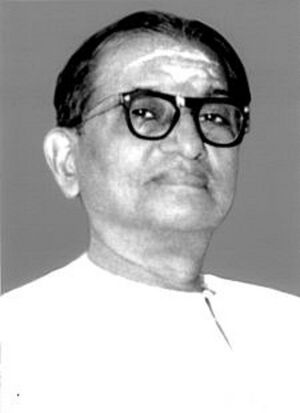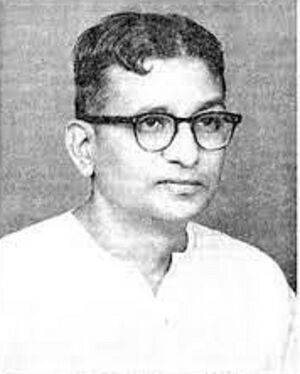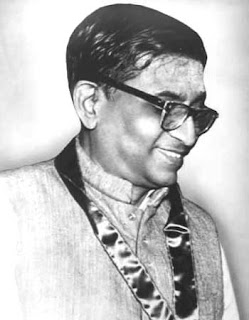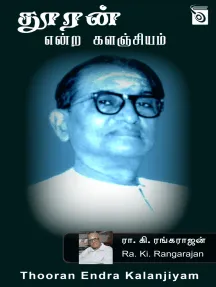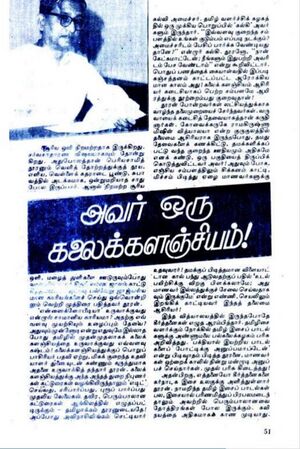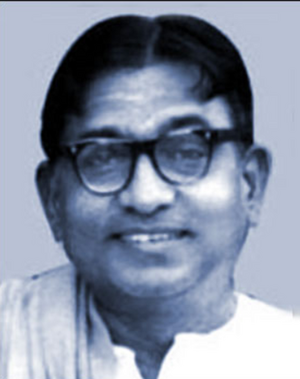Periyasamy Thooran
To read the article in English: Periyasamy Thooran.
Periyasamy Thooran (also known as M.P. Periyasaamy Thooran, Periyasami Thooran) (September 26, 1908 - June 20, 1987) was a Tamil scholar. He compiled the first modern Tamil encyclopedia. A traditional poet, translator, publisher, lyricist and composer of children's songs, he was one of the earliest scholars to study Subramania Bharati's life and works. Owing to his contributions as principal editor of both the first modern Tamil encyclopedia and the first children's encyclopedia in Tamil, he is regarded as one of the chief architects of the modern Tamil intellectual space.
Birth and education
Periyasamy Thooran was born in Manjakkatuvalasu, a village near Modakurichi in Erode district, on September 26, 1908 to Pazhanivelappa Goundar and Pavaathaal. At birth, he was named Manjakkattuvalasu Pazhaniyappa Goundar Periyasamy. His surname 'Thooran' refers to a subcaste (or koottam) within the Kongu Goundar caste. Thooran's mother died when he was young.
He attended primary school in Modakurichi, his hometown. Influenced by Thirumalaisamy Ayyangar, a teacher in his school, he got interested in Tamil language and literature. He was a member of the Karungalpalayam library in Erode, he read extensively in his school days. He completed high school at the Mahajanasabha High School in Erode. In 1927, he completed his intermediate degree from Presidency College, Chennai, and in 1929, he obtained an L.T. (Licentiate in Teaching) in mathematics.
He enrolled for an undergraduate degree in 1930. However, he was involved in various student agitation movements as part of the Indian freedom struggle. In 1931, on March 23, the heroes of the movement Bhagat Singh, Sukhdev and Rajguru were hung to death. Periyasamy Thooran boycotted his final degree exams to participate in the protests against this event. Thooran never completed his degree till the end.
Personal Life
Thooran married Kaliyammal on May 1, 1939. He had three daughters, Saradamani, Vasantha and Vijayalakshmi, and a son, Sudhanthira Kumar. Sudhanthira Kumar's wife's name was Shenbagatilakam.
From 1929, Thooran was employed as a schoolteacher. From 1948-1968 he served as the principal editor of the Tamil encyclopedia and from 1968 - 1976, the principal editor of the children's encyclopedia. He retired in 1976, after which he became a full-time writer. He lived and died in Coimbatore.
Educational Service
Thooran began his life as a school teacher. From 1929, he worked as a teacher in Diamond Jubilee High School, Gobichettipalayam. In 1931, after he had dropped out of undergraduate studies, he started work as a teacher at the Pothanur and Periyanayakkan Palayam branches of the Ramakrishna High School. This was a chain of school founded on Gandhian educatational ideals by Thi.Su.Avinasilingam Chettiar. Chettiar mentions in his diaries that during the time Thooran worked there, he accepted only a very small amount of money as salary and lived frugally like an ascetic, owing to his principled belief that educational institutions ought to be run at low cost. In 1934, when Gandhi visited Coimbatore to collect money for the Harijan Fund, he gave a speech at Ramakrishna High School. During this visit, Periyasamy Thooran made the welcome address felicitating Gandhi and translated his speech for the public. He worked at the Ramakrishna schools till 1948.
Politics
Periyasamy Thooran dropped out of school to participate in the protests organized by the youth wing of the Congress Party. He was involved in the village self-governance movements of the Congress. While working as a teacher, too, he did volunteer work in the villages near Gobichettipalayam and Pothanur to improve the lives of the people there. He was involved in the propogation of Khadi along with Kovai Iyamuthu and others. A close associate of Thi.Su.Avinasilingam Chettiyar, Thooran supported the Congress till the end of his days.
Spirituality
Periyasamy Thooran hailed from a family of Murugan devotees. He was particularly attached to the form of the deity enshrined at the Sennimalai temple. He was a composer and lyricist, and has composed many remarkable devotional songs on Murugan, including the famous "Muruga muruga endral urugadho undhan ullam."(Link) In his last days, Periyasamy Thooran regarded Yogi Ramsurat Kumar with high esteem. He has composed devotional songs about him.
Journalism
When Periyasamy Thooran was a B.A. student at the Presidency College, Chennai, along with friends such as C. Subramaniam, Ne.Thu.Sundaravadivelu, O.V.Alakesan, Ila.Ki.Muthusamy, K.M.Ramasamy, K.S.Periyasamy, K.S.Pazhanisamy and others, he organized a forum called Vanamalar Sangam (Wildflower Collective). They brought out a literary magazine called Pithan. The magazine was printed at the Sadhu printing press run by Tamil scholar and poet Thiru.V.Kalyanasundara Mudaliyar.
Later he brought out a popular magazine called Kalachakkaram in the mould of Time magazine, sponsored by P. Nachimuthu Goundar (father of industrialist Pollachi N. Mahalingam). He ran this magazine along with the poet Ve.Ra.Deivasigamani Goundar. In the magazine, he published various poetic works including Kalamega Pulavar's Chittiramadal, the text of Vadivel Pillai's opera Mohinivilasam, Avinasi Pulavar's Thingalur Nondi Nadagam and Saminadha Kavinjar's Kondraivendhan Venba.
Roles and Responsibilities
A list of responsibilities that Periyasamy Thooran held
- Secretary, Tamil Nadu Development Board
- Secretary, Children's Writers Association
- President, Tamil Writers Association
- Coordinator of a committee researching ancient Tamil musical scales called Pann.
Literary Life
Periyasamy Thooran got into literature through the influence of Thiru.V.Kalyanasundara Mudaliyar. He carefully read the emerging nationalistic Indian literature in his youth. He could read with equal felicity in both English and Hindi, and thus familiarised himself with both European literature and Indian literature. Thooran's literary contribution spans a wide range of intellectual activities: traditional Tamil poetic compositions, free verse, short stories, plays, children's literature, studies on Bharati, introductory texts on various subjects and translations.
Traditional poetic compositions (Marabukavidhai)
Periyasamy Thooran was primarily interested in the traditional Tamil poetic form, marabukavidhai, that had gained new life in the 20th century. C. Subramania Bharathi, Bharathidasan and Kavimani Desigavinayagam Pillai were his forerunners in this endeavour; Namakkal Kavignar Ve. Ramalinga Pillai was his contemporary. These poems preserved the meter and rhyme scheme of the traditional marabukavidhai seyyul verses, but the language, contrary to the archaic style of the old poems, was fresh and contemporary, closer to spoken Tamil. These poems were composed in relatively simple meters like asiriyappa, sindhu etc.
Thooran's poems were first published as volumes titled Ilanthamizha, Minnal poo, Nilaa pinju and Patti paravaigal. Later they were compiled into a single anthology, Thooran kavidhaigal. It was brought out by the publishing house Pari Nilayam. Thooran employs many forms in his poetry. There are poems like Kaivalam which are structured like folk songs, verse poems telling a story like Veeran Kumaran, Kizhaviyum Ranavum, Prithvi Raj - Samyukthai, episolatory poems like Kadhalikku kaditham, Badhil, Kadidham and poems structured like dialogue, like Odakkaran, in his anthology.
Free verse (Vasanakavidhai)
Thooran wrote vasanakavidhai or free verse poems in Bharati's style. Volumes of these poems include Irulum oliyum, Arivaai nee, Mele para, Manida ezhuga, Yaradhu, Vazhkai payanam, Sandhippu, Namadhu vazhi etc. Thooran was not familiar with the New Poetry movement emerging from Si.Su.Chellappa's little magazine Ezhuthu.
Children's literature
Most of Thooran's books were literature aimed at children, including stories and songs. He wrote 16 children's books. Six of these were collections of stories, five novels, two works of science fiction and three were poetry collections. These books were all published by Palaniyappa Brothers, Chennai.
The songs that Thooran wrote for children were composed keeping the age of the child in mind. He has composed songs like nursery rhymes for very young children, as well as written fiction aimed at older kids. 'Aanaiyum poonaiyum', 'Nalla nalla paatu', 'Mazhalai amudham' are some of his songs for children made popular through the radio. Olaikkili, Thambiyin thiramai, Nattiyarani, Manjal Muttai and Nilappatti are some of his popular children's stories. He wrote widely read and much beloved tales of adventure and daring sprinkled with scientific trivia for older children. Some of the popular titles in this genre included Mayakkallan, Soora Puli, Kollimalai Kallan, Sangagiri Kottai Marmam, Tharangampadi Thangapudhaiyal etc.
Pedagogy
Thooran wrote many books for children introducing complex scientific concepts in simple language. His Children's Encyclopedia is still considered a fundamental text in Tamil academic circles. Thooran wrote various books on child psychology aimed at parents and teachers - Manamum adhan vilakkamum, Karuvil valarum kuzhandhai, Parambariyam, Adimanam, Petror kodutha perungkodai, Kuzhandhai manamum athan malarchiyum etc.
These books, which were published at the same time that elementary school education became widespread in Tamil Nadu, created a fundamental and deep impact on Tamil society. In traditional schools and hereditary educational models, teaching was always accompanied by strong punishments. They were educational models that believed in dragging the child forcefully into the world of adults. Thooran proposed that instead, the teacher and parent ought to enter the world of the child and teach them there. His works on pedagogy were widely read in the teacher training centres of Tamil nadu.
